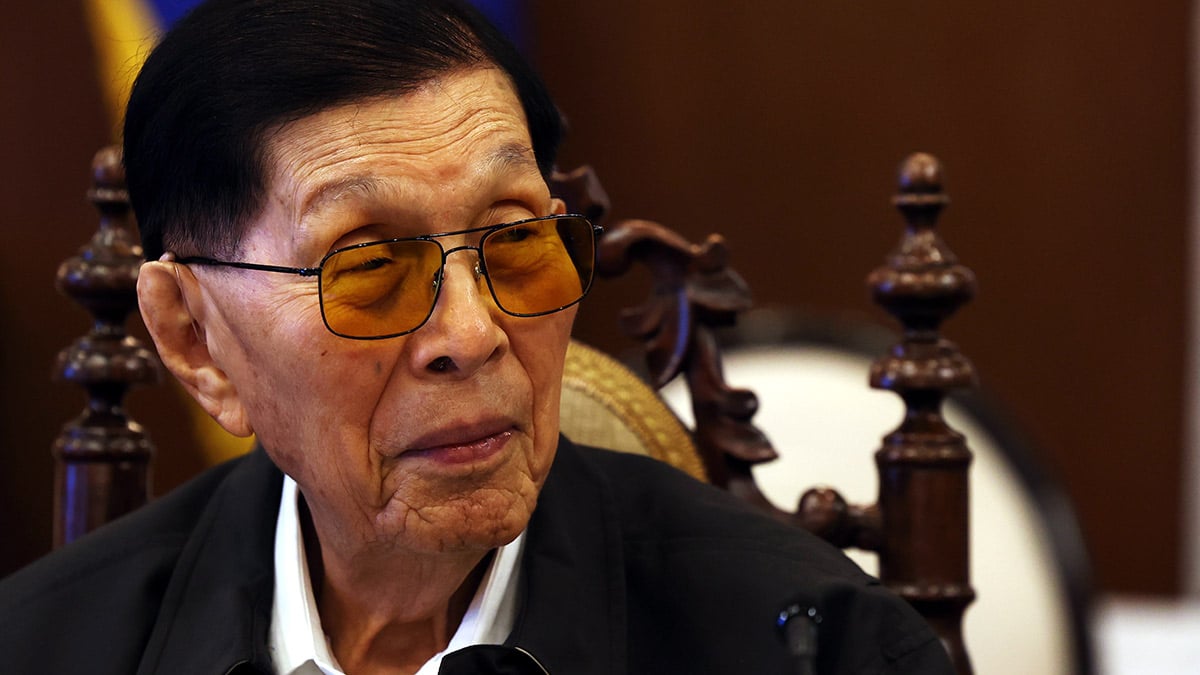MANILA, Philippines — The Supreme Court has allowed the Sandiganbayan to proceed with the plunder trial of former Senator and now Chief Presidential Legal Counsel, Juan Ponce Enrile.
Voting 13-0 with two justices having “no part,” the Supreme Court dismissed Enrile’s petition for prohibition of his plunder case, in which he is accused of pocketing more than P172 million in pork barrel funds.
That allegation was among the highlights of the pork barrel scandal that broke in 2013.
READ: Enrile to seek dismissal of graft case over ‘pork barrel’ scam
“Enrile’s doubts as to the Sandiganbayan’s fealty to the law is no cause of action and his inability to trust in the judicial system does not merit relief,” the high court said in its 32-page decision penned by Associate Justice Maria Filomena Singh. “The Court does not act on the basis of fear, baseless assumptions of bad faith, or conjectures…. [Since] litigants demand fairness from the courts, the judiciary similarly expects fairness from litigants,” it added.
The decision, released only on Monday, was promulgated on Feb. 24.
Bill of particulars
The case stemmed from the June 5, 2014, plunder complaint filed by the Ombudsman against Enrile, his chief of staff at the time Jessica Reyes, Ronald Lim, John Raymund de Asis, and Janet Lim Napoles—whom the Sandiganbayan would find guilty of plunder five years later for the misuse of Sen. Ramon Revilla Jr.’s pork barrel fund.
According to the complaint, Enrile and the four other accused had amassed P172 million from his Priority Development Assistance Fund (PDAF) from 2004 to 2010.
On July 10 that year, Enrile filed a motion for a bill of particulars, allowing the accused to request specific details from the prosecution to prepare properly for trial.
But his motion was denied, prompting Enrile to challenge that ruling in a petition for certiorari before the Supreme Court.
The next year, the high court partially granted Enrile’s petition and ordered the prosecution to submit a bill of particulars as sought by his earlier motion.
Among these particulars were the amounts of “kickbacks or commissions” that the accused were alleged to have received, the projects under Enrile’s PDAF, and the names of Napoles’ supposed nongovernmental organizations that allegedly profited from those projects.
Prosecution’s evidence
As the case dragged on, Enrile later objected to the contents of the pretrial order, including the evidence marked, which he said should have been limited to the prosecution’s bill of particulars.
The Sandiganbayan denied that appeal in 2021 and decided to proceed with the trial. The prosecution presented among its witnesses Ombudsman field investigator Ryan Medrano, who testified that the projects under Enrile’s PDAF were not implemented.
In March 2022, Enrile petitioned the high court to dismiss the plunder case against him, again arguing that the prosecution’s evidence must be limited to the bill of particulars.
“At its core, Enrile’s claim is rooted in the argument that the Sandiganbayan must not allow the prosecution to present evidence that is irrelevant to the issues in the main case,” the Supreme Court said in its decision.
In dismissing Enrile’s petition, it noted that the case was a “question of the admissibility of the prosecution’s evidence”—such as Medrano’s testimony which the high court said Enrile was free to object.
“In the event that the Sandiganbayan allows the admission of evidence which Enrile deems to be inadmissible, and thereafter convicts him, Enrile has the remedy of appeal,” the Supreme Court said.
Given these available remedies, the high tribunal said it was not necessary to bar the Sandiganbayan from proceeding with the plunder case, much less to order its dismissal.
‘Free exercise of discretion’
The Supreme Court also ruled that the Sandiganbayan did not act with grave abuse of discretion amounting to lack or excess of jurisdiction when it refused to limit the prosecution’s evidence to the bill of particulars and allowed its inclusion in the pretrial order.
The high court clarified that a bill of particulars does not indicate the prosecution’s entire trial strategy. Therefore, the prosecution may present other evidence during the trial not mentioned in the bill of particulars.
“Clearly, to limit the prosecution to the presentation only of evidence mentioned in the information and the bill of particulars would be to shackle and tie its hands and deprive it of the free exercise of its discretion to determine who and what to present,” the Supreme Court said.
Enrile, 100, was sought for comment about the decision but had yet to reply as of Monday night.
At the height of the pork barrel scandal which the Inquirer first reported, the Sandiganbayan in 2014 ordered the arrest of then Senators Enrile, Revilla and Jinggoy Estrada for plunder and multiple counts of graft.
Citing his advanced age and poor health, the Supreme Court granted bail to Enrile in August 2015. But the antigraft court’s Third Division denied his appeal to throw out the plunder charge.
In December 2018, the court’s Special First Division cleared Revilla of plunder but convicted his legislative officer, Richard Cambe, and Napoles.
Cambe, who was detained at New Bilibid Prison, died of a stroke at the Ospital ng Muntinlupa in April 2021. He was 53.
In January 2024, the Fifth Division acquitted Estrada of plunder but convicted him of the less serious offenses of direct and indirect bribery.
Revilla, 57, and Estrada, 61, are back in the Senate after being reelected in the 2019 and 2022 elections, respectively. —with reports from Inquirer Research and Melvin Gascon
